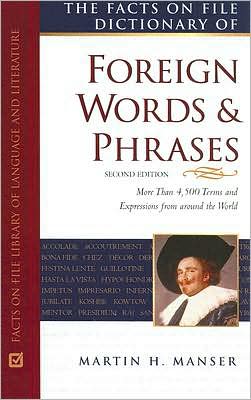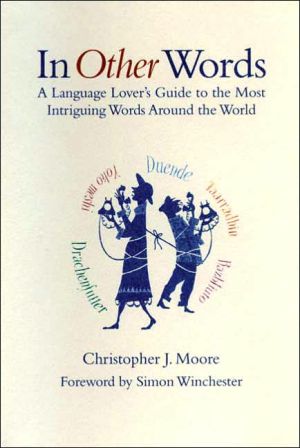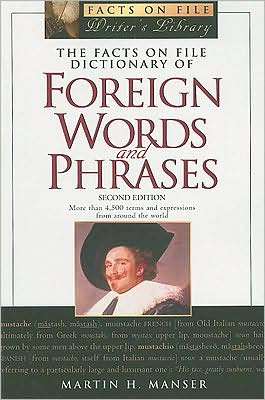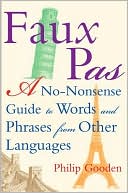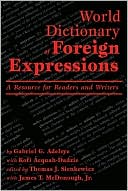The Facts on File Dictionary of Foreign Words and Phrases
"The American poet and essayist Ralph Waldo Emerson described the English language as "the sea which receives tributaries from every region under heaven." With more than 4,000 entries, this dictionary explains the meanings and origins of terms that have entered the English lexicon from foreign tongues." "Drawn from the fields of language and literature, religion, law, politics and economics, music, entertainment, and cuisine, entries include a definition of the word or phrase in English;...
Search in google:
"The American poet and essayist Ralph Waldo Emerson described the English language as "the sea which receives tributaries from every region under heaven." With more than 4,000 entries, this dictionary explains the meanings and origins of terms that have entered the English lexicon from foreign tongues." "Drawn from the fields of language and literature, religion, law, politics and economics, music, entertainment, and cuisine, entries include a definition of the word or phrase in English; language of origin; meaning in the original language; part of speech; pronunciation; and examples or quotations to illustrate usage." The dictionary features entries adopted from countless languages, including French (mise-en-scene), German (Sturm und Drang), Latin (quo vadis), Arabic (mujahideen), Russian (glasnost), Chinese (tao), Greek (hoi polloi), Turkish (kismet), Italian (lingua franca), and many others. Library Journal This dictionary is based on a great concept to explain foreign words and phrases that have found their way into our language but, with only about 4000 entries, it more often frustrates. The vast majority of the words listed here come from French and Latin (not surprisingly, since 40 percent of English is derived from French, often through Latin). And though some 60 languages are represented, it is often with only a handful of words. Do we really have only one or two words from Aramaic, Basque, Czech, Egyptian, Finnish, and Polish and only 15 from all the Scandinavian languages? Why include "blond," "bra," "bulletin," "cot," "dessert," "dollar," "minor," "restaurant," and "sofa" as foreign words when there are thousands of others that would be more useful to define? Can we really accept that "margarine" and "menu" are foreign words when their meanings in the original language are entirely different? That said, Manser (The Hearthside Bible Dictionary) has included many music and food terms that could be useful, especially for readers who stick to French, Italian, Spanish, and Hindi. In addition, the Latin terms (many from jurisprudence) are particularly helpful. Each entry includes information on the original meaning and spelling of the word or phrase and an example of its use in English. Recommended for larger public libraries, at least until a more satisfying edition is published. Kitty Chen Dean, Nassau Coll., Garden City, NY Copyright 2002 Cahners Business Information.
\ Library JournalThis dictionary is based on a great concept to explain foreign words and phrases that have found their way into our language but, with only about 4000 entries, it more often frustrates. The vast majority of the words listed here come from French and Latin (not surprisingly, since 40 percent of English is derived from French, often through Latin). And though some 60 languages are represented, it is often with only a handful of words. Do we really have only one or two words from Aramaic, Basque, Czech, Egyptian, Finnish, and Polish and only 15 from all the Scandinavian languages? Why include "blond," "bra," "bulletin," "cot," "dessert," "dollar," "minor," "restaurant," and "sofa" as foreign words when there are thousands of others that would be more useful to define? Can we really accept that "margarine" and "menu" are foreign words when their meanings in the original language are entirely different? That said, Manser (The Hearthside Bible Dictionary) has included many music and food terms that could be useful, especially for readers who stick to French, Italian, Spanish, and Hindi. In addition, the Latin terms (many from jurisprudence) are particularly helpful. Each entry includes information on the original meaning and spelling of the word or phrase and an example of its use in English. Recommended for larger public libraries, at least until a more satisfying edition is published. Kitty Chen Dean, Nassau Coll., Garden City, NY Copyright 2002 Cahners Business Information.\ \ \ \ \ School Library JournalGr 7 Up- The more than 4500 words and expressions in this update of the 2002 edition are those that are used unchanged, or almost unchanged, from their source language. Notable among the 500 new entries are fresh adoptions such as sudoku and an increased number of prefixes and suffixes. Entries include idioms (the French homme moyen sensual , "the man in the street"); scientific terms (the Latin nucleus , "kernel"); gastronomic terminology (the Italian farfalle, "butterflies"); religious terms (swami , from the Sanskrit for "master" or "lord"); legal and political terms (apparatchik , from the Russian for "political machine"), and many other words and phrases. The short entries include an American-English pronunciation guide; the language of origin; the part of speech; a direct translation; the meaning as used in English; and, in many cases, an illustrative quote. Cross-references guide readers where a word may have alternate spellings. Some entries are obscure but many are words that are heavily used. Though a helpful listing by tongue shows that English has been influenced by many different languages, including some "smaller" ones (Narragansett, Basque), it also serves to illustrate bias, as it is obvious that Latin, French, German, and Italian dominate. Still, this is a captivating title to browse.-Henrietta Thornton-Verma, School Library Journal\ \ \ \ School Library JournalGr 8 Up-Organization is one of the strong points of this resource containing 44 biographical essays. From Martha Washington to Laura Bush, each entry begins with important dates and a brief overview of the subject's life or impact while separate sections cover "Early Life," "Marriage and Family," "Presidency and First Ladyship," and "Legacy." These sections will allow for quick and easy access of facts and be useful for comparative studies. The engaging entries describe how each woman's personality shaped the role. Additionally, readers will learn how the issues of the period and changing expectations contributed to the evolution of this position. Boxed sidebars contain information about their husbands and anecdotes about each woman. An annotated list of suggested readings follows each article. Black-and-white photographs, drawings, and reproductions add interest. A valuable feature of this book is the inclusion of nine topical essays on aspects of the First Lady's role (as presidential partner, as campaigner, etc.), White House hostesses, and life in the White House. A list of the special interests of these individuals is included in the essay on "First Ladies and Policy Issues, Causes, or Charities." An extensive bibliography and a list of libraries, museums, historic sites, and Web sites are also provided. A useful tool for students researching these women.-Lana Miles, Duchesne Academy, Houston, TX RESOURCE UPDATE Copyright 2002 Cahners Business Information.\ \ \ \ \ BooknewsLinguist Manser (he's authored other dictionaries) has gathered foreign terms used in English and defined them, giving their pronunciation, country of origin, and a sample sentence to demonstrate use. The introduction provides a guide to pronunciation. An alphabetical index of the countries of origin is provided, each with a list of the words included from that country. Annotation c. Book News, Inc., Portland, OR (booknews.com)\ \
